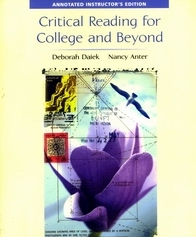Evaluating Research:
Endorsements
Many books--especially paper backs--include endorsements on the cover. The content of the endorsements and the credibility of the person who wrote it can help you judge the credibility of the book itself.
Discussion
The following endorsement by Beth Childress appears on the back cover of Deborah Daiek and Nancy Anter's Critical Reading for College and Beyond.
None of the (reading texts) I have previewed covers the subject as totally as Critical Reading for College and Beyond. The combination of carefully arranged and well-defined chapters along with the inclusion of some wonderful and interesting reading passages followed by insightful and meaningful practice questions is not just another text, but rather a monument and powerful option for those teaching in the area of developmental reading.
Childress, a faculty member at Armstrong Atlantic State University, is a credible source who uses specific examples to support her contention that Critical Reading for College and Beyond is a good book. However, as critical readers, we know that the publisher decides what is printed on the cover of a book; that if Childress had written that the book was terrible that her comments would not have appeared.
While remaining critical readers, we can use the endorsements on books to gage credibility because people like Childress want to maintain their own reputations. Therefore, it is unlikely that they would give a positive review to a book that did not deserve it. Furthermore, the more specific the reviewer's comments, the easier it is to accept them.
Special Notes Concerning Web Pages
Looking to see who is involved with a web site or has recommended the web site can help us judge credibility. If we respect a source that links to a site, it is easier for us to assume the site is credible (unless, of course, the site is being used as an example of what not to do).
Recommendations on Facebook
 I use Facebook personally as well as professionally. My Facebook friends are from a variety of political persuasions, religions, ages, and so forth. Many of them I have never met but I friended because of a comment they made on someone else's website. Every day, I read a variety of articles which are recommended by these Facebook friends. However, I do not read everything that is recommended.
I use Facebook personally as well as professionally. My Facebook friends are from a variety of political persuasions, religions, ages, and so forth. Many of them I have never met but I friended because of a comment they made on someone else's website. Every day, I read a variety of articles which are recommended by these Facebook friends. However, I do not read everything that is recommended.
Unfortunately, I have a few friends--both liberals and conservatives--who regularly recommend articles from sources that are not credible. Those individuals have lost their credibility as far as I am concerned and I no longer take the time to look at their recommendations. Others consistently recommend thoughtful articles from credible sources. I am more likely to read the articles they like because of their reputations as thoughtful endorsers.
When I say that someone is thoughtful, I do not necessarily mean that I agree with the person. In fact, I look forward to reading quality articles that challenge my worldview.
